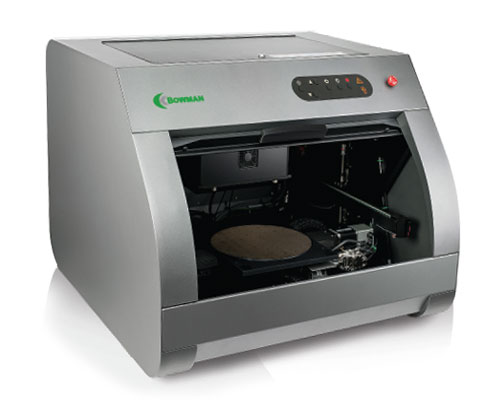


The W Series Micro XRF was engineered for the precise measurement of the smallest X-ray features found in semiconductors and microelectronics.
Bowman’s W Series uses poly-capillary optics to focus the X-ray beam to 7.5 μm FWHM, the world’s smallest for coating thickness analysis using XRF instruments. A 150X magnification camera is used to measure features on that scale; it is accompanied by a secondary, low-magnification camera for live-viewing samples and birds-eye macro-view imaging. Bowman’s dual-camera system lets operators see the entire part, click the image to zoom with the high-mag camera, and pinpoint the feature to be programmed and measured.
A programmable X-Y stage with precision less than +/- 1 μm for each axis is used to select and measure multiple points; Bowman pattern recognition software and autofocus features also do this automatically. The system’s 3D mapping capability can be used to view the topography of a coating on a part such as a silicon wafer.
W Series instruments include 7.5 μm optics with molybdenum anode tube (chromium and tungsten are optional) and a high-resolution, large-window Silicon Drift Detector (SDD) which processes more than 2 million counts per second. SDDs are the standard, industry-wide, for complex films. Their high count rate capability is key to achieving a low minimum detection limit (MDL) and highest spectral resolution.
The W Series is the 7th model in Bowman’s XRF instrument suite. Like others in the portfolio, it simultaneously measures up to 5 coating layers and runs advanced Xralizer software to quantify coating thickness from the detected photons. Xralizer software combines intuitive visual controls with time-saving shortcuts, extensive search capability, and "one-click" reporting. The software also simplifies user creation of new applications.
| X-ray Excitation | 50 W Mo target Flex-Beam Capillary Optics @7.5 FWHM Optional: Cr or W |
| Detector | Large window Silicon drifted detector with 135eV resolution or better |
| Focal Depth | Fixed at 0.02" |
| Video Magnification | 150X with micro-view camera on 20" screen (up to 600x digital zoom) 10~20X with macro-view camera |
| Working Environment : | 68°F (20°C) to 77°F (25°C) and up to 98% RH, non-condensing |
| Weight | 190kg (420lbs) |
| Programmable XY : | XYZ travel: 300mm (11.8") x 400mm (15.7") x 100mm (3.9") XY tabletop: 305mm (12") x 406mm (16") X-axis accuracy: 2.5um (100u"); X-axis precision: 1um (40u") Y-axis accuracy: 3um (120u") ; Y-axis precision: 1um (40u") Z-axis accuracy: 1.25um (50u") ; Z-axis precision: 1um (40u") |
| Element Range | Aluminum 13 to Uranium 92 |
| Analysis layers and elements | 5 layers (4 layers + base) and 10 elements in each layer. Composition analysis of up to 25 elements simultaneously |
| Primary Filters | 4 primary filters |
| Digital Pulse Processing | 4096 CH digital multi-channel analyser with flexible shaping time. Automatic signal processing including dead time correction and escape peak correction |
| Processor : | Intel, CORE i5 3470 (3.2GHz), 8GB DDR3 Memory, Microsoft Windows 10 Prof, 64bit equivalent |
| Camera optics : | 1/4" CMOS-1280×720 VGA resolution |
| Power Supply : | 150W, 100~240 volts; frequency range 47Hz to 63Hz |
| Dimensions (HxWxD) : | Internal: 735mm (29") x 914mm (36") x 100mm (4") External: 940mm (37") x 990mm (39") x 787mm (31") |
| Other New Features : | Z protection array Auto focus Focus laser Pattern recognition |
Copyright © 2025 www.xscientific.tech
All rights reserved.